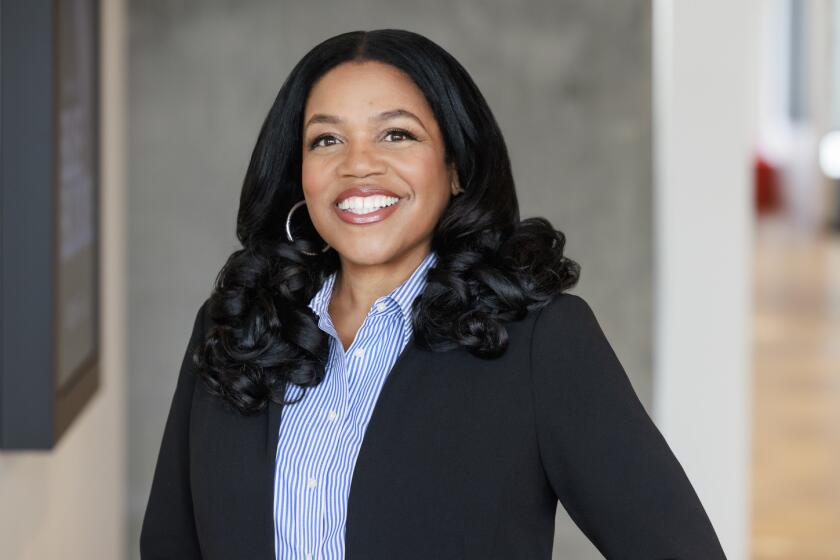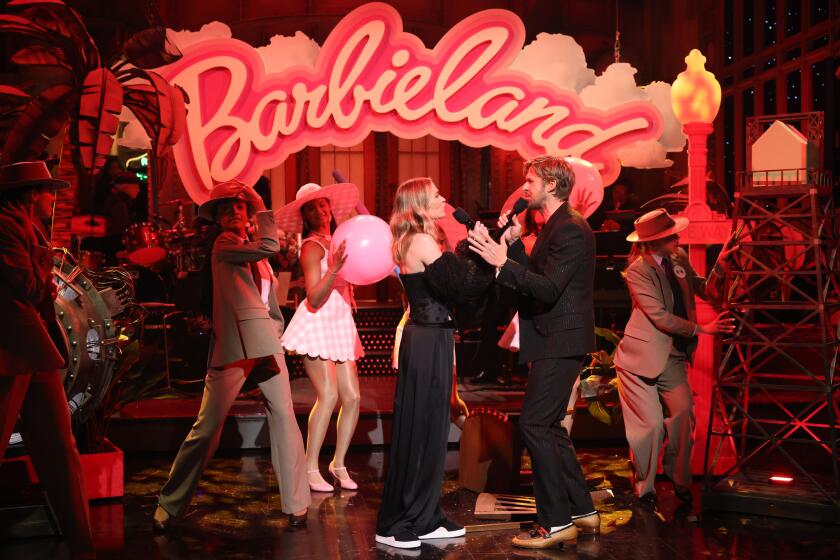HBO letting it ride on ‘Luck’
Even before the pilot for “Luck,” the new David Milch-Michael Mann series about horse racing, appeared on HBO in December, word began to get around that this thoroughbred -- however fierce -- took a while to get around the track. And this was even from people who liked the show. Just wait till episode four, they said. Or five.
If most television -- even high-toned television -- is a collection of short stories, “Luck” is a novel. A big, sprawling one, with a layered setting and close to a dozen main characters, some woven together in complex ways and many not who they initially appear to be. It’s every bit as ambitious and multifaceted as “The Wire,” which also aired on HBO between 2002 and 2008.
But was it really necessary week after week to sketch an intricate ecosystem as complicated as the teeming life of a rain forest -- from trainers to aspiring jockeys to dead-end gamblers to the dodgy financiers who make the whole thing run? Did Milch, a reputed mad genius, whose “Deadwood” brought Shakespearean soliloquy to the Wild West, consider making a linear show with maybe a single protagonist and a conventional plot?
“Never,” Milch said, in a hotel suite with Mann and Dustin Hoffman, who plays an enigmatic moneyman and one of the program’s key figures. “I always thought these were lives, and spirits, which interpenetrated even when they did not intersect. One of the gifts of Dustin’s performance is his spirit dominates even when he isn’t physically present.”
Milch, who wrote the screenplay for the series, talks this way a lot -- a mixture of abstraction, literary terminology and boundless praise for his colleagues. Mann, who oversees the directing side of the program, expresses himself more pragmatically.
“What’s fascinating about David’s screenplay,” he says, “with all these different groups and stories, people’s whole life histories and ambitions -- there are so many of them. And to not have preludes, not have contexts, to just parachute into these lives. ... The challenge is, how do you evoke that in ways that the viewer doesn’t need Dramamine after 20 minutes?”
Boyhood memories
For Milch, whose temperament is poetic and philosophical, racing -- and cheating at -- horses goes back to some of the human race’s oldest impulses. But the show’s literal origins are a bit more earthbound, dating to his early years as a kid in upstate New York, borrowing his father’s fedora to ride along to the track in Saratoga Springs. (He’s since become an owner of horses and, by his own admission, a gambler.)
Back then, six decades ago, he got a sense of how richly interconnected the track’s sociology was. “Literally from the time I was 5 years old, and the waiter approached me and I told him who I wanted to bet on,” he says. “One of the things I think Michael has executed so brilliantly is a sense of the simultaneity of those worlds, so you naturally flow from one to another.”
That’s for sure. Despite a massive ad campaign that features only Hoffman’s guarded and besuited Ace Bernstein character, the term “ensemble cast,” which includes Nick Nolte, Dennis Farina, John Ortiz and Jill Hennessy, has rarely been so aptly applied. The story’s direction, like the show’s emotional center, is all over the place. “I’ve used the metaphor,” Hoffman says, “of the jazz combo, where they can riff off each other but are somehow playing the same tune.”
The characters are all orbiting the same patch of land -- Arcadia’s Santa Anita racetrack -- so they’re connected, Mann says, whether they know one another or not. Viewers who stick with the show will see just how true that is.
Hoffman’s Bernstein emerges first, returning to the world from a three-year stint in prison with intentions of getting involved in the racetrack, something his felony conviction complicates. (“You get out of prison and what do you want?” Mann asks as he explains how he directed that opening scene. “Sex, and pizza.”)
The existing world of the track involves a batch of jockeys (including a young Irish woman aspiring to greatness), a trainer of ambiguous loyalties, a battered old Kentucky horse owner who seems to move with a dark cloud over him and a quartet of lowlife gamblers known collectively as “the degenerates.” It’s when the degenerates make an unexpected score early in the series that the whole solar system -- which also includes jockey’s agents, security guards, horse doctors, capitalists and others -- is put into motion.
Power couple
Another thing that makes “Luck” anomalous is its unconventional power-sharing arrangement. Mann and Milch are both executive producers, with Mann in charge of the directing -- he directed the pilot himself and oversaw the directors of the others -- and Milch writing everything and retaining the creator credit.
To heighten the tension a bit: Both are known to be strong-willed, and Mann apparently banned Milch from the set while directing the pilot episode. (HBO has conceded some “clashes” despite what it calls an otherwise fruitful working experience.)
Most television shows, of course, have a single chief, with others working as subordinates. “This isn’t ‘most,’ ” Mann asserts. “David has shows he’s run, I’ve had shows I’ve run ... so this is different. Dave, Eric [Roth, a co-executive producer] and I had lots of conversations about the script, but ultimately that’s gotta be [Milch’s] domain. Making that world there, making it manifest on film, that becomes what I do -- from casting, location, interpretation, all that. That goes all the way through to color timing. And David comes in and sees the finished product.”
Says Hoffman: “How should this arrangement -- how could this arrangement -- be any different than any marriage, or parents with their children? At a certain point, it’s an arm wrestle over vision, if you care about what you’re doing. ... And that’s what happens in the house: ‘What kind of party is this gonna be?’ ”
Milch says that despite speculations that two control freaks could never work together, it’s been the best collaboration of his life. “We don’t always have the experience of being able to trust our collaborators in the most fundamental ways,” he says. “And in an exercise of faith, the more you believe, the more you accomplish.”
While the show’s two helmsmen speak about how much they loved working together, Hoffman begins choking on the water he’s sipping and quickly recovers. “He acts that way,” Milch says in a soft voice, “when he hears a lie.”
Unlikely trio
Jockeys, gamblers, executive producers ... will viewers have the patience to follow all of these twists and turns? HBO is certainly hoping so: This show was not cheap to produce.
December’s pilot drew 1.14 million viewers, losing 62% from the audience for “Boardwalk Empire,” which preceded it. And horse racing is hardly a going concern for most 21st century Americans. But in some ways, HBO really is different, and it may be that shows like “The Sopranos” and “The Wire” have stretched the attention span of at least a significant fraction of the television audience.
The cable network likes to boast about its unconventional programming, and many of its shows do smash the medium’s orthodoxies.
One of the things that’s unconventional about “Luck,” after all, is that its three main players are in television right now at all.
Milch is revered by many, and his and Steven Bochco’s “NYPD Blue” was an unambiguous success. But neither of his last two shows -- “Deadwood” and “John From Cincinnati” -- got past a third season. Besides a few cameos, Hoffman has never done a television program. And Mann has devoted his last two decades to movies like “The Insider” and “Collateral” -- he’s not done a major television show since producing “Miami Vice” in the ‘80s.
He doesn’t feel like he ever left the small screen. “I studied film in Europe,” Mann says about his early days, in the ‘60s. “And in the European tradition, directors do opera, they do TV, they do movies. ... You’re motivated by the material, that’s it.
“And it’s no secret: The best work, the best content, happening right now is on cable. When we look back at this 10 years from now, we might realize we were fortunate enough to be part of the golden age of television.”
Hoffman adds: “Which I think comes from having no committee,” and letting show runners, not network suits, really run their own shows. The result is a series, he says, in which he and the other actors are able to feel their way to a perfect scene. “Here you’re allowed to work the way a painter, or someone writing a novel, works. You go to work each day, and it starts to lead you to something. That’s what they’ve allowed me to be a part of here.”
--
The complete guide to home viewing
Get Screen Gab for everything about the TV shows and streaming movies everyone’s talking about.
You may occasionally receive promotional content from the Los Angeles Times.



